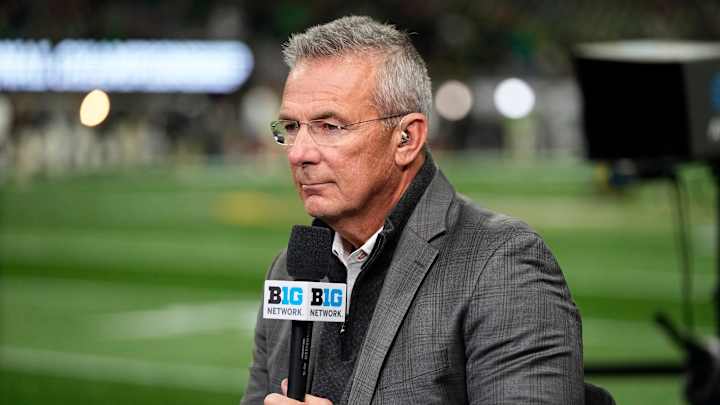
Urban Meyer, the three-time national championship-winning coach and longtime analyst, has weighed in on the evolving landscape of college football by naming the programs he believes are poised to become the sport’s premier “feeder systems” to the NFL. As college football increasingly mirrors the professional game in structure, resources, and personnel, Meyer’s comments reflect growing trends around player development, recruiting, and institutional investment.
According to Meyer, the term “feeder system” refers to more than just sending a high volume of players to the league. It involves building a program culture centered on preparing athletes for the next level—on and off the field. It’s about adopting pro-style systems, assembling elite coaching staffs with NFL experience, investing in player development infrastructure, and fostering mental discipline. He believes only a select group of programs are fully embracing that identity.
Leading the list, unsurprisingly, is Georgia. Under Kirby Smart, the Bulldogs have produced a staggering number of NFL Draft picks over the past five seasons, especially on defense. Meyer praised Georgia for its “NFL factory” approach—stacking five-star talent, enforcing physical, pro-style systems, and consistently demanding excellence at every level. “They don’t just recruit well, they develop at an elite level,” Meyer said.
Alabama, though facing transitional challenges with Nick Saban’s retirement, remains on Meyer’s list. He credited Saban for building the blueprint and suggested that new head coach Kalen DeBoer has the structure in place to maintain the program’s NFL pipeline, particularly with an emphasis on offensive innovation and quarterback development.
Meyer also highlighted Ohio State, where he once coached, noting its continued production of NFL-caliber wide receivers, quarterbacks, and defensive backs. He pointed to Brian Hartline’s receiver room as one of the most NFL-ready in the country, saying, “If you’re a wideout with NFL dreams, Columbus should be your first stop.”
Surprisingly to some, Michigan was another program Meyer emphasized. Despite some skepticism around its offensive style under Jim Harbaugh, the Wolverines have developed into one of the most balanced teams in the country, producing tough, NFL-ready linemen and defensive players. Meyer acknowledged that Harbaugh’s imprint remains strong, even after his departure to the NFL, and expects Michigan to keep producing pros.
Rounding out Meyer’s group were a few up-and-coming programs he called “next-wave feeder systems.” Among them:
- Texas, now in the SEC, with its recruiting resurgence and NFL-caliber staff under Steve Sarkisian.
- LSU, a traditional powerhouse with a strong recent record of producing receivers and defensive backs.
- Oregon, which Meyer praised for its innovation and national recruiting reach, saying the Ducks are positioning themselves as a West Coast NFL gateway.
Meyer also discussed the growing role of NIL and the transfer portal in shaping these feeder systems. He believes that top programs with deep donor bases and professional-level facilities will continue to separate themselves, especially as players seek schools that mirror the NFL experience from day one.
“College football is more professional than ever,” Meyer said. “If a program doesn’t train and treat players like future pros, they’ll fall behind.”
He cited coaching continuity and alignment with NFL philosophies as crucial, suggesting that players are increasingly evaluating programs based on how well they simulate Sunday preparation. From strength and conditioning to film study to scheme familiarity, the best feeder systems operate like NFL prep schools.
Meyer’s comments have already stirred debate among fans and analysts. Some argue that schools like USC, Penn State, and Florida State deserve inclusion. Others point to rising programs such as Tennessee or Texas A&M, which are assembling elite rosters and staffing accordingly.
But Meyer made it clear: NFL teams are watching certain college programs more closely than ever before, not just for talent but for readiness. In today’s college football climate, becoming a true “feeder system” is a badge of honor—and a competitive advantage.






